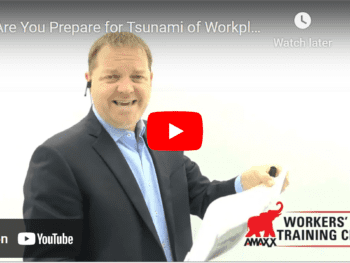Concern about Ebola is at record proportions in the US – but if a worker contacts it, is the event compensable? Sorry, but the answer is a firm “that depends”.
Ebola, like the common cold, is a virus which is spread in similar ways from human to human and has initial symptoms which are very similar. The two largely differ in the severity of the consequences. In fact, if the severity of Ebola were the same as the common cold there would be little concern about it.
Ebola Is Transmitted Similar To Common Cold
Generally speaking, the common cold, even transmitted from worker to worker is not compensable, Even if it were, the condition usually resolves in a week and requires no medical treatment or prescription drugs; therefore, the consequences would result in no payments under the comp insurance.
But Ebola, with a mortality rate over 50%, and sometimes as high as 90%, is a different matter. Therefore, if worker to worker infection occurs, then work comp litigation is certain to follow. But a carrier, raising a defense that “this is no different than the common cold” will not receive a serious consideration.
Disease Generally Compensable If Considered Characteristic Feature of Employment
First, are diseases spread at work accidents, or occupational diseases? If the disease is spread by sneezes or cuts, it is generally considered an accident. If it is spread by presence in the environment, it is usually an occupational disease, IF the exposure is a characteristic feature of the employment. A health worker is necessarily exposed to many communicable diseases, general office workers have occasional exposure but it is not characteristic of the employment, and therefore not compensable.
Does that mean that Ebola is not compensable except for health workers? The rules may be modified where there is widespread fear. The incidents of 9/11 were, under the old rules of insurance and work comp not compensable, except for first responders since they were the acts of “the common enemy”, i.e., hostile forces, terrorists, bandits. A first responder necessarily deals with such forces as part of the job title, a general victim does not.
National Ebola Outbreak Likely Treated Similar to 9/11
But those rules were put aside during the night hours following 9/11, when the NY rating board was called to work non-stop to create a comp solution. A new solution was necessary because the actuary formulas had never computed the effects of mass terrorism. The computation is now there, hidden by euphemisms, because the chance of future loss is far from rare. (For the faint hearted, don’t try to find the numbers. They assume mass casualties of over 25,000 for future acts, which include small nuclear devices.) The new solution was also necessary because it altered basic law without an act of court or legislature.
A national outbreak of Ebola would almost certainly receive the same treatment.
This would only duplicate the origins of the workers’ compensation laws. They were not created not by a new concern for the injured but the creation of much higher new risks involving high temperatures, pressures, concentrated acids, speeds and heights – all of which demanded new remedies.
Therefore, we can say that Ebola with not be treated as the common cold.
Author: Attorney Theodore Ronca is a practicing lawyer from Aquebogue, NY. He is a frequent writer and speaker, and has represented employers in the areas of workers’ compensation, Social Security disability, employee disability plans and subrogation for over 30 years. Attorney Ronca can be reached at 631-722-2100. medsearch7@optonline.net
©2014 Amaxx Risk Solutions, Inc. All rights reserved under International Copyright Law.
WORK COMP CALCULATOR: http://www.LowerWC.com/calculator.php
MODIFIED DUTY CALCULATOR: http://www.LowerWC.com/transitional-duty-cost-calculator.php
WC GROUP: http://www.linkedin.com/groups?homeNewMember=&gid=1922050/
SUBSCRIBE: Workers Comp Resource Center Newsletter
Do not use this information without independent verification. All state laws vary. You should consult with your insurance broker, attorney, or qualified professional.










